![[HorribleSubs] Natsume Yuujinchou Shi - 10 [720p].mkv_snapshot_10.01_[2012.03.05_15.45.12] [HorribleSubs] Natsume Yuujinchou Shi - 10 [720p].mkv_snapshot_10.01_[2012.03.05_15.45.12]](https://lh3.ggpht.com/-8HG9lY-mrsY/T1VbsuCnktI/AAAAAAAA1aE/CMptE8Ewu48/%25255BHorribleSubs%25255D%252520Natsume%252520Yuujinchou%252520Shi%252520-%25252010%252520%25255B720p%25255D.mkv_snapshot_10.01_%25255B2012.03.05_15.45.12%25255D_thumb.jpg?imgmax=800) |
![[HorribleSubs] Natsume Yuujinchou Shi - 10 [720p].mkv_snapshot_17.04_[2012.03.05_15.52.15] [HorribleSubs] Natsume Yuujinchou Shi - 10 [720p].mkv_snapshot_17.04_[2012.03.05_15.52.15]](https://lh5.ggpht.com/-H7xyH1S4CDA/T1VbuZuuaSI/AAAAAAAA1aU/y-jjaFkLUi4/%25255BHorribleSubs%25255D%252520Natsume%252520Yuujinchou%252520Shi%252520-%25252010%252520%25255B720p%25255D.mkv_snapshot_17.04_%25255B2012.03.05_15.52.15%25255D_thumb.jpg?imgmax=800) |
![[HorribleSubs] Natsume Yuujinchou Shi - 10 [720p].mkv_snapshot_19.53_[2012.03.05_15.55.03] [HorribleSubs] Natsume Yuujinchou Shi - 10 [720p].mkv_snapshot_19.53_[2012.03.05_15.55.03]](https://lh5.ggpht.com/-RhLmIcQ1b5s/T1VbvgHlprI/AAAAAAAA1ak/Ka05k3DLmeY/%25255BHorribleSubs%25255D%252520Natsume%252520Yuujinchou%252520Shi%252520-%25252010%252520%25255B720p%25255D.mkv_snapshot_19.53_%25255B2012.03.05_15.55.03%25255D_thumb.jpg?imgmax=800) |
For some reason it seems as if every two-part episode of this series features one episode that’s much better than the other, and this one was no exception.
If I’m to be honest the last few episodes of Natsume Yuujinchou have been pretty vanilla. I don’t recall an ep in four seasons that I haven’t at least liked, but the word I’d use for these last few is nondescript – by NY standards. They don’t stand out and they aren’t really memorable, and especially after having just watched the really powerful Hotarubi no Mori e – which plays like a great two-part “Natsume” episode in some ways – I was really feeling the absence of that special quality the series has when it’s really good.
Fortunately the Moon-splitting Festival arc concluded in really solid fashion, combining some very strong statements of dedication by the characters to each other, and an achingly bittersweet coda to the story of the rival Gods Houdzuki (Midorikawa Hikaru) and Fudzuki. As I’ve said here before, I’m a sucker for stories of forgotten Gods (something this show does exceptionally well, as does Neil Gaiman) and the sense of loss that attaches itself to that was much more pronounced this week. While Natsume is continuing his ruse at being Houdzuki-gama, facts are beginning to emerge, mostly courtesy of Nattori’s suspicious nature. Indeed, the real Houdzuki has been sealed for three years, and may no longer be on the mountain at all.
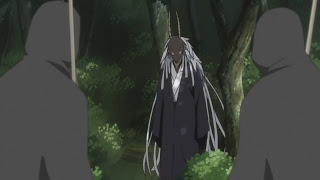 Natsume being Natsume, he can’t accept that – and in fact noticed Houdzuki’s presence while being swept away downriver. One might easily ask just why finding Houdzuki is so important to Natsume, but you might as well ask a fish why he swims instead of walks – it’s simply the only way Natsume knows how to be. The reality emerging here is that Natsume is in reality much stronger than Nattori, and Nattori knows it – and Nyanko-sensei too, I think. Nattori of course would benefit from having Natsume as a professional ally, but he realizes there’s something fragile beneath all that power that would be lost – and in turn, Natsume sees the loneliness and self-doubt in Nattori and tries to protect the older man in his own way.
Natsume being Natsume, he can’t accept that – and in fact noticed Houdzuki’s presence while being swept away downriver. One might easily ask just why finding Houdzuki is so important to Natsume, but you might as well ask a fish why he swims instead of walks – it’s simply the only way Natsume knows how to be. The reality emerging here is that Natsume is in reality much stronger than Nattori, and Nattori knows it – and Nyanko-sensei too, I think. Nattori of course would benefit from having Natsume as a professional ally, but he realizes there’s something fragile beneath all that power that would be lost – and in turn, Natsume sees the loneliness and self-doubt in Nattori and tries to protect the older man in his own way.
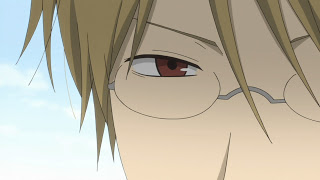 In between them of course is Hiiragi, who clearly has strong feelings for both. I think she appreciates that Natsume sees the side of her master that no one else does, but I also thinks she loves Natsume for who he is – loves him in the protective sense, and perhaps in the other sense too. But the problem at hand demands resolution, and though Natsume and Nattori are able to capture the beast and theoretically win the competition with Fudzuki, in reality the other Kami sees Natsume for who he is – and it’s up to Madara to protect the boy, despite the very real possibility that he’ll be cursed for opposing a God. The veneer of practicality surrounding Madara’s devotion to Natsume is growing thinner all the time, as the truth emerges as that veneer is removed like an old coat of paint, revealing the truth that was hidden beneath.
In between them of course is Hiiragi, who clearly has strong feelings for both. I think she appreciates that Natsume sees the side of her master that no one else does, but I also thinks she loves Natsume for who he is – loves him in the protective sense, and perhaps in the other sense too. But the problem at hand demands resolution, and though Natsume and Nattori are able to capture the beast and theoretically win the competition with Fudzuki, in reality the other Kami sees Natsume for who he is – and it’s up to Madara to protect the boy, despite the very real possibility that he’ll be cursed for opposing a God. The veneer of practicality surrounding Madara’s devotion to Natsume is growing thinner all the time, as the truth emerges as that veneer is removed like an old coat of paint, revealing the truth that was hidden beneath.
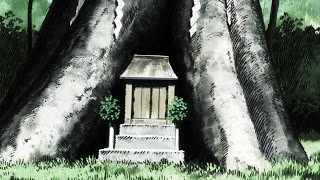 In the end, though Houdziki is unsealed, the reality is painful – he’s so weakened by a gradual loss of followers that he could not even break the weak seal that imprisoned him. Nominally his enemy, Fudzuki sees the truth – their time to protect the mountain has passed. The humans that willed them into existence have forgotten and abandoned them, and the festival they hold now is merely a simulation of one that once held real meaning, a diversion. They leave the mountain together, their followers in tow, old forgotten Gods on a sort of post-retirement adventure trip, and entrust the mountain to the whims of nature. I can think of no author other than Midorikawa-sensei who can so consistently capture both the joy and sorrow in the same moment, yet I think her message is that this is nothing exceptional but rather quite the usual – joy and sorrow are as inseparable as these two Gods, forever moving in and out of lives in tandem. By avoiding the one, you deprive yourself of the other. It seems so simple, but why is it so difficult to portray as well as she does?
In the end, though Houdziki is unsealed, the reality is painful – he’s so weakened by a gradual loss of followers that he could not even break the weak seal that imprisoned him. Nominally his enemy, Fudzuki sees the truth – their time to protect the mountain has passed. The humans that willed them into existence have forgotten and abandoned them, and the festival they hold now is merely a simulation of one that once held real meaning, a diversion. They leave the mountain together, their followers in tow, old forgotten Gods on a sort of post-retirement adventure trip, and entrust the mountain to the whims of nature. I can think of no author other than Midorikawa-sensei who can so consistently capture both the joy and sorrow in the same moment, yet I think her message is that this is nothing exceptional but rather quite the usual – joy and sorrow are as inseparable as these two Gods, forever moving in and out of lives in tandem. By avoiding the one, you deprive yourself of the other. It seems so simple, but why is it so difficult to portray as well as she does?
![[HorribleSubs] Natsume Yuujinchou Shi - 10 [720p].mkv_snapshot_06.42_[2012.03.05_15.41.27] [HorribleSubs] Natsume Yuujinchou Shi - 10 [720p].mkv_snapshot_06.42_[2012.03.05_15.41.27]](https://lh5.ggpht.com/-Mxe1bTx4I_k/T1VbwomhQtI/AAAAAAAA1a0/6NryzZSe010/%25255BHorribleSubs%25255D%252520Natsume%252520Yuujinchou%252520Shi%252520-%25252010%252520%25255B720p%25255D.mkv_snapshot_06.42_%25255B2012.03.05_15.41.27%25255D_thumb.jpg?imgmax=800) |
![[HorribleSubs] Natsume Yuujinchou Shi - 10 [720p].mkv_snapshot_08.24_[2012.03.05_15.43.09] [HorribleSubs] Natsume Yuujinchou Shi - 10 [720p].mkv_snapshot_08.24_[2012.03.05_15.43.09]](https://lh3.ggpht.com/-aWl4-kZi9n4/T1VbyGMJ6sI/AAAAAAAA1bE/m3yqvmvi1hM/%25255BHorribleSubs%25255D%252520Natsume%252520Yuujinchou%252520Shi%252520-%25252010%252520%25255B720p%25255D.mkv_snapshot_08.24_%25255B2012.03.05_15.43.09%25255D_thumb.jpg?imgmax=800) |
![[HorribleSubs] Natsume Yuujinchou Shi - 10 [720p].mkv_snapshot_08.59_[2012.03.05_15.44.09] [HorribleSubs] Natsume Yuujinchou Shi - 10 [720p].mkv_snapshot_08.59_[2012.03.05_15.44.09]](https://lh4.ggpht.com/-fozxkfo4Yio/T1VbzmTMpII/AAAAAAAA1bU/BSO6OVJFTac/%25255BHorribleSubs%25255D%252520Natsume%252520Yuujinchou%252520Shi%252520-%25252010%252520%25255B720p%25255D.mkv_snapshot_08.59_%25255B2012.03.05_15.44.09%25255D_thumb.jpg?imgmax=800) |
![[HorribleSubs] Natsume Yuujinchou Shi - 10 [720p].mkv_snapshot_09.27_[2012.03.05_15.44.38] [HorribleSubs] Natsume Yuujinchou Shi - 10 [720p].mkv_snapshot_09.27_[2012.03.05_15.44.38]](https://lh5.ggpht.com/-eu99Ei-GCt4/T1Vb09B4bVI/AAAAAAAA1bk/iuZNAsR2UAw/%25255BHorribleSubs%25255D%252520Natsume%252520Yuujinchou%252520Shi%252520-%25252010%252520%25255B720p%25255D.mkv_snapshot_09.27_%25255B2012.03.05_15.44.38%25255D_thumb.jpg?imgmax=800) |
![[HorribleSubs] Natsume Yuujinchou Shi - 10 [720p].mkv_snapshot_10.52_[2012.03.05_15.46.03] [HorribleSubs] Natsume Yuujinchou Shi - 10 [720p].mkv_snapshot_10.52_[2012.03.05_15.46.03]](https://lh3.ggpht.com/-qERlSfCmxrc/T1Vb1zdKmLI/AAAAAAAA1b0/pR9Zl7NDp9Q/%25255BHorribleSubs%25255D%252520Natsume%252520Yuujinchou%252520Shi%252520-%25252010%252520%25255B720p%25255D.mkv_snapshot_10.52_%25255B2012.03.05_15.46.03%25255D_thumb.jpg?imgmax=800) |
![[HorribleSubs] Natsume Yuujinchou Shi - 10 [720p].mkv_snapshot_12.11_[2012.03.05_15.47.22] [HorribleSubs] Natsume Yuujinchou Shi - 10 [720p].mkv_snapshot_12.11_[2012.03.05_15.47.22]](https://lh6.ggpht.com/-H6kH2p1tdX4/T1Vb3CEsGaI/AAAAAAAA1cE/U_xQRhHbPu8/%25255BHorribleSubs%25255D%252520Natsume%252520Yuujinchou%252520Shi%252520-%25252010%252520%25255B720p%25255D.mkv_snapshot_12.11_%25255B2012.03.05_15.47.22%25255D_thumb.jpg?imgmax=800) |
![[HorribleSubs] Natsume Yuujinchou Shi - 10 [720p].mkv_snapshot_12.56_[2012.03.05_15.48.07] [HorribleSubs] Natsume Yuujinchou Shi - 10 [720p].mkv_snapshot_12.56_[2012.03.05_15.48.07]](https://lh3.ggpht.com/-0dFyi_qYQ88/T1Vb4Ur0WoI/AAAAAAAA1cU/UmSQq5-RJrE/%25255BHorribleSubs%25255D%252520Natsume%252520Yuujinchou%252520Shi%252520-%25252010%252520%25255B720p%25255D.mkv_snapshot_12.56_%25255B2012.03.05_15.48.07%25255D_thumb.jpg?imgmax=800) |
![[HorribleSubs] Natsume Yuujinchou Shi - 10 [720p].mkv_snapshot_14.24_[2012.03.05_15.49.35] [HorribleSubs] Natsume Yuujinchou Shi - 10 [720p].mkv_snapshot_14.24_[2012.03.05_15.49.35]](https://lh3.ggpht.com/-OjLYqLC85Rg/T1Vb5pybnvI/AAAAAAAA1ck/H6AXjNk-RLI/%25255BHorribleSubs%25255D%252520Natsume%252520Yuujinchou%252520Shi%252520-%25252010%252520%25255B720p%25255D.mkv_snapshot_14.24_%25255B2012.03.05_15.49.35%25255D_thumb.jpg?imgmax=800) |
![[HorribleSubs] Natsume Yuujinchou Shi - 10 [720p].mkv_snapshot_14.34_[2012.03.05_15.49.44] [HorribleSubs] Natsume Yuujinchou Shi - 10 [720p].mkv_snapshot_14.34_[2012.03.05_15.49.44]](https://lh5.ggpht.com/-l2GzyA0NyyA/T1Vb67_oR5I/AAAAAAAA1c0/wIqbu_hW2FI/%25255BHorribleSubs%25255D%252520Natsume%252520Yuujinchou%252520Shi%252520-%25252010%252520%25255B720p%25255D.mkv_snapshot_14.34_%25255B2012.03.05_15.49.44%25255D_thumb.jpg?imgmax=800) |
![[HorribleSubs] Natsume Yuujinchou Shi - 10 [720p].mkv_snapshot_15.18_[2012.03.05_15.50.29] [HorribleSubs] Natsume Yuujinchou Shi - 10 [720p].mkv_snapshot_15.18_[2012.03.05_15.50.29]](https://lh3.ggpht.com/-4stWox8ix_c/T1Vb8MpJtdI/AAAAAAAA1dE/HCkKNQc2WJE/%25255BHorribleSubs%25255D%252520Natsume%252520Yuujinchou%252520Shi%252520-%25252010%252520%25255B720p%25255D.mkv_snapshot_15.18_%25255B2012.03.05_15.50.29%25255D_thumb.jpg?imgmax=800) |
![[HorribleSubs] Natsume Yuujinchou Shi - 10 [720p].mkv_snapshot_15.27_[2012.03.05_15.50.38] [HorribleSubs] Natsume Yuujinchou Shi - 10 [720p].mkv_snapshot_15.27_[2012.03.05_15.50.38]](https://lh5.ggpht.com/-cJzqMOri4dA/T1Vb9FgngzI/AAAAAAAA1dU/mXp4UynFN8w/%25255BHorribleSubs%25255D%252520Natsume%252520Yuujinchou%252520Shi%252520-%25252010%252520%25255B720p%25255D.mkv_snapshot_15.27_%25255B2012.03.05_15.50.38%25255D_thumb.jpg?imgmax=800) |
![[HorribleSubs] Natsume Yuujinchou Shi - 10 [720p].mkv_snapshot_15.30_[2012.03.05_15.50.41] [HorribleSubs] Natsume Yuujinchou Shi - 10 [720p].mkv_snapshot_15.30_[2012.03.05_15.50.41]](https://lh5.ggpht.com/-KdzXWZYdBuw/T1Vb-gKdXXI/AAAAAAAA1dk/9v2K3Tvnl1k/%25255BHorribleSubs%25255D%252520Natsume%252520Yuujinchou%252520Shi%252520-%25252010%252520%25255B720p%25255D.mkv_snapshot_15.30_%25255B2012.03.05_15.50.41%25255D_thumb.jpg?imgmax=800) |
![[HorribleSubs] Natsume Yuujinchou Shi - 10 [720p].mkv_snapshot_16.05_[2012.03.05_15.51.16] [HorribleSubs] Natsume Yuujinchou Shi - 10 [720p].mkv_snapshot_16.05_[2012.03.05_15.51.16]](https://lh3.ggpht.com/-t-QL4FmL4s8/T1Vb_-sKfdI/AAAAAAAA1d0/cqIPjcfdClI/%25255BHorribleSubs%25255D%252520Natsume%252520Yuujinchou%252520Shi%252520-%25252010%252520%25255B720p%25255D.mkv_snapshot_16.05_%25255B2012.03.05_15.51.16%25255D_thumb.jpg?imgmax=800) |
![[HorribleSubs] Natsume Yuujinchou Shi - 10 [720p].mkv_snapshot_16.26_[2012.03.05_15.51.37] [HorribleSubs] Natsume Yuujinchou Shi - 10 [720p].mkv_snapshot_16.26_[2012.03.05_15.51.37]](https://lh3.ggpht.com/-dIKXkVOdJyo/T1VcBNkFldI/AAAAAAAA1eE/18vUb5dJ1L4/%25255BHorribleSubs%25255D%252520Natsume%252520Yuujinchou%252520Shi%252520-%25252010%252520%25255B720p%25255D.mkv_snapshot_16.26_%25255B2012.03.05_15.51.37%25255D_thumb.jpg?imgmax=800) |
![[HorribleSubs] Natsume Yuujinchou Shi - 10 [720p].mkv_snapshot_17.39_[2012.03.05_15.52.50] [HorribleSubs] Natsume Yuujinchou Shi - 10 [720p].mkv_snapshot_17.39_[2012.03.05_15.52.50]](https://lh6.ggpht.com/-y4Eio3giacM/T1VcCAhQFPI/AAAAAAAA1eU/8HJB9rTnWgw/%25255BHorribleSubs%25255D%252520Natsume%252520Yuujinchou%252520Shi%252520-%25252010%252520%25255B720p%25255D.mkv_snapshot_17.39_%25255B2012.03.05_15.52.50%25255D_thumb.jpg?imgmax=800) |
![[HorribleSubs] Natsume Yuujinchou Shi - 10 [720p].mkv_snapshot_18.16_[2012.03.05_15.53.27] [HorribleSubs] Natsume Yuujinchou Shi - 10 [720p].mkv_snapshot_18.16_[2012.03.05_15.53.27]](https://lh5.ggpht.com/-hs0x7bKqZu4/T1VcDN_fniI/AAAAAAAA1ek/5pmydWqHu_4/%25255BHorribleSubs%25255D%252520Natsume%252520Yuujinchou%252520Shi%252520-%25252010%252520%25255B720p%25255D.mkv_snapshot_18.16_%25255B2012.03.05_15.53.27%25255D_thumb.jpg?imgmax=800) |
![[HorribleSubs] Natsume Yuujinchou Shi - 10 [720p].mkv_snapshot_18.26_[2012.03.05_15.53.37] [HorribleSubs] Natsume Yuujinchou Shi - 10 [720p].mkv_snapshot_18.26_[2012.03.05_15.53.37]](https://lh5.ggpht.com/-DQjmTxmlbIo/T1VcECEXYzI/AAAAAAAA1e0/RYSSJfqvTO4/%25255BHorribleSubs%25255D%252520Natsume%252520Yuujinchou%252520Shi%252520-%25252010%252520%25255B720p%25255D.mkv_snapshot_18.26_%25255B2012.03.05_15.53.37%25255D_thumb.jpg?imgmax=800) |
![[HorribleSubs] Natsume Yuujinchou Shi - 10 [720p].mkv_snapshot_19.00_[2012.03.05_15.54.11] [HorribleSubs] Natsume Yuujinchou Shi - 10 [720p].mkv_snapshot_19.00_[2012.03.05_15.54.11]](https://lh3.ggpht.com/-wjoBdExG42Q/T1VcFdTIpdI/AAAAAAAA1fE/U0miZggfUy8/%25255BHorribleSubs%25255D%252520Natsume%252520Yuujinchou%252520Shi%252520-%25252010%252520%25255B720p%25255D.mkv_snapshot_19.00_%25255B2012.03.05_15.54.11%25255D_thumb.jpg?imgmax=800) |
![[HorribleSubs] Natsume Yuujinchou Shi - 10 [720p].mkv_snapshot_19.16_[2012.03.05_15.54.27] [HorribleSubs] Natsume Yuujinchou Shi - 10 [720p].mkv_snapshot_19.16_[2012.03.05_15.54.27]](https://lh4.ggpht.com/-SDoGVGy0ZP0/T1VcGWsBXVI/AAAAAAAA1fU/S9_RC9ScTg0/%25255BHorribleSubs%25255D%252520Natsume%252520Yuujinchou%252520Shi%252520-%25252010%252520%25255B720p%25255D.mkv_snapshot_19.16_%25255B2012.03.05_15.54.27%25255D_thumb.jpg?imgmax=800) |
![[HorribleSubs] Natsume Yuujinchou Shi - 10 [720p].mkv_snapshot_21.24_[2012.03.05_15.56.35] [HorribleSubs] Natsume Yuujinchou Shi - 10 [720p].mkv_snapshot_21.24_[2012.03.05_15.56.35]](https://lh4.ggpht.com/-HgOVaQi4pC8/T1VcHnuYsYI/AAAAAAAA1fk/xWSEF59QKKo/%25255BHorribleSubs%25255D%252520Natsume%252520Yuujinchou%252520Shi%252520-%25252010%252520%25255B720p%25255D.mkv_snapshot_21.24_%25255B2012.03.05_15.56.35%25255D_thumb.jpg?imgmax=800) |
![[HorribleSubs] Natsume Yuujinchou Shi - 10 [720p].mkv_snapshot_22.08_[2012.03.05_15.57.19] [HorribleSubs] Natsume Yuujinchou Shi - 10 [720p].mkv_snapshot_22.08_[2012.03.05_15.57.19]](https://lh5.ggpht.com/-0n7jNG2hpIc/T1VcI_hkT9I/AAAAAAAA1f0/bZarLLmNE2U/%25255BHorribleSubs%25255D%252520Natsume%252520Yuujinchou%252520Shi%252520-%25252010%252520%25255B720p%25255D.mkv_snapshot_22.08_%25255B2012.03.05_15.57.19%25255D_thumb.jpg?imgmax=800) |


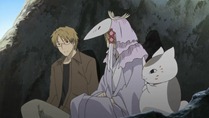
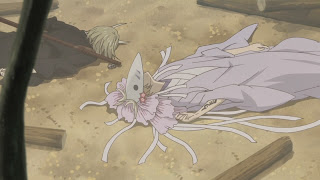
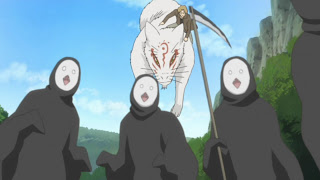

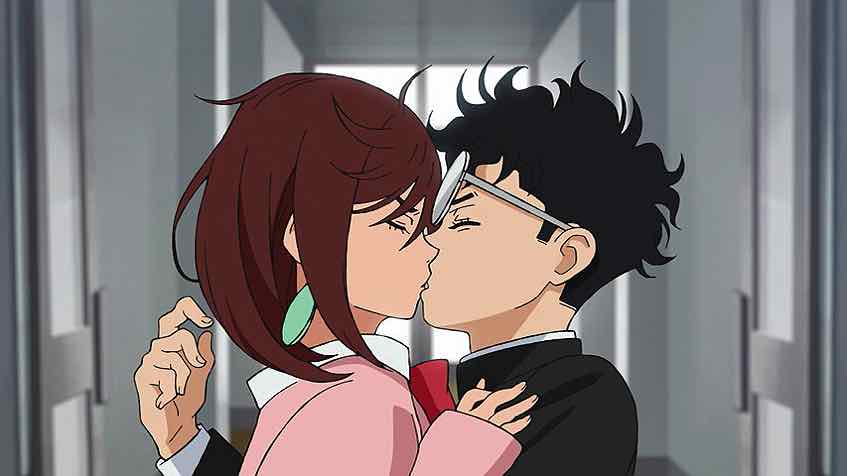
myna5194
March 6, 2012 at 1:18 amNeil Gaiman is my favorite author.
Glad to see that this arc wrapped up so nicely.
darkly
March 6, 2012 at 2:12 amI agree, Neil Gaiman, while not being my favorite, is awesome.
I mentioned this before, but did anyone else see the symbolism with the two opposing gods and the two opposing players, Natsume and Natori?
In the manga notes Yuiki Midorikawa talks about how she wanted to show Natsume and Natori get called in to conflicting sides of the same job, by Youkai and humans respectively. When the two youkai that seemed so different disappeared into the same light it echoes the comradery that is forming between N and N. This was cemented in Natsume's statement of how they make up for each others differences. (In the manga it says they "complement" each other.)
admin
March 6, 2012 at 2:21 amI'll presume you both have read "American Gods"?
myna5194
March 6, 2012 at 2:41 amOf course. I really need to reread that.
"Good Omens" still stands as my favorite, though.
darkly
March 6, 2012 at 5:13 amI couldn't get into it for some reason; maybe it was just my mood. "Sandman" is my favorite comic/graphic novel series however.